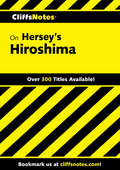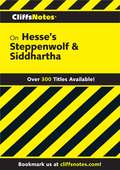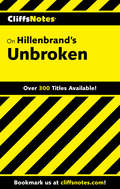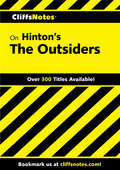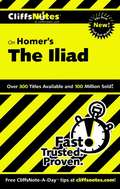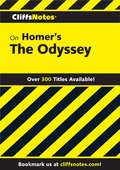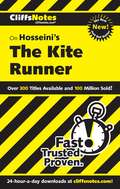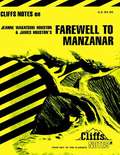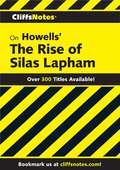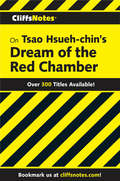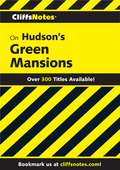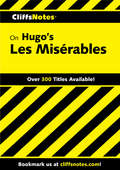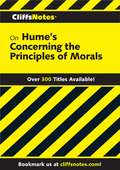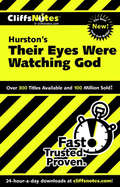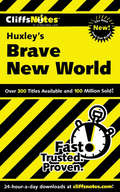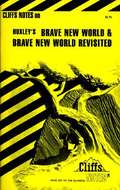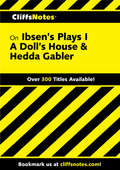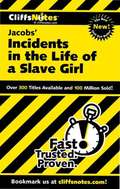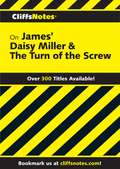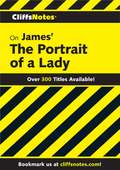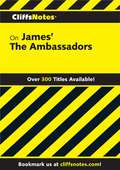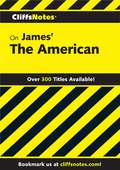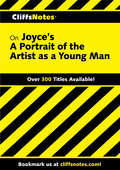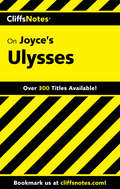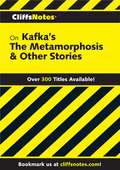- Table View
- List View
CliffsNotes on Hersey's Hiroshima
by Susan Van KirkThe original CliffsNotes study guides offer expert commentary on major themes, plots, characters, literary devices, and historical background. The latest generation of titles in this series also feature glossaries and visual elements that complement the classic, familiar format. CliffsNotes on Hiroshima captures the essence of the novel, which is based on detailed interviews with survivors of the bombing. Hiroshima takes the extraordinary and inexplicable event and show how it impacts six ordinary human lives. Author John Hersey personalized the event so that Americans, as well as a worldwide audience, could begin to understand the repercussions of the detonation of the atom bomb. This concise supplement to Hersey's Hiroshima helps you understand the overall structure of the novel, actions and motivations of the characters, and the social and cultural perspectives of the author. Features that help you study includeChapter-by-chapter summaries and commentariesA map of Hiroshima that shows the location of the main characters and areas of greatest destructionA glossary that helps you get the most out of your readingA critical essay that describes the people and events that led to the decision to drop the bomb.A review section that tests your knowledgeClassic literature or modern modern-day treasure—you'll understand it all with expert information and insight from CliffsNotes study guides.
CliffsNotes on Hesse's Steppenwolf & Siddhartha
by Carolyn R WelchThis CliffsNotes guide includes everything you’ve come to expect from the trusted experts at CliffsNotes, including analysis of the most widely read literary works.
CliffsNotes on Hillenbrand's Unbroken
by Mike NappaCliffsNotes on Laura Hillenbrand's Unbroken, now adapted to film, includes everything you've come to expect from the trusted experts at CliffsNotes, including summaries and analyses of Hillenbrand's riveting novel. Features of this Lit Note includeFocused summaries of the plot and analysis of important themes, symbols, and character developmentCharacter analyses of major characters, focusing on what motivates each characterBrief synopsis of the novelShort quizDiscussion of the film adaptation of Hillenbrand's novel
CliffsNotes on Hinton's The Outsiders
by Janet ClarkThe original CliffsNotes study guides offer expert commentary on major themes, plots, characters, literary devices, and historical background. The latest generation of titles in this series also feature glossaries and visual elements that complement the classic, familiar format. In CliffsNotes on The Outsiders, you’ll dig into a novel of the 1960s is a story about teenagers written by a teenager. Ponyboy Curtis, a 14-year-old boy, struggles with right and wrong in a society within which he feels he is an outsider. He and his brothers, lower-class "greasers," fight the "Socs," the rich kids, for 14 days. Social issues gaining notice in the '60s—teen pregnancy, underage drinking, and violence—still find relevance among S. E. Hinton's readers today. This concise supplement to The Outsiders helps you understand the overall structure of the novel, actions and motivations of the characters, and the social and cultural perspectives of the author.Features that help you study includeChapter-by-chapter summaries and commentariesPersonal background of the authorA character map that graphically illustrates the relationships among the charactersCritical essays on the movie versus the book and how society has changed since the 1960sA review section that tests your knowledgeClassic literature or modern-day treasure—you'll understand it all with expert information and insight from CliffsNotes study guides.
CliffsNotes on Homer's Iliad
by Bob LinnThe original CliffsNotes study guides offer expert commentary on major themes, plots, characters, literary devices, and historical background. The latest generation of titles in this series also feature glossaries and visual elements that complement the classic, familiar format.Homer's classic Greek epic, The Iliad, plunges you into the midst of the battle of Troy as swords flash and ancient angers flare -- and CliffsNotes is at your side through the fray to shield you from being unprepared for class discussion. CliffsNotes character analyses and critical essays delve into the depths of well-fueled feuds and fatal choices to explain the context of the heroic exploits of Achilles, Agamemnon, Hektor, and Priam. As Achaians fight Trojans to the bitter end for the hand of fair Helen, turn to CliffsNotes on The Iliad for plot summaries and commentaries that make sense of the themes of strife and reconciliation in this fast-action work of classic literature.Other features that help you figure out this important work includeA close look at the author's life, which offers insight into his writingA background of the epic poem, to help you understand the settingList of characters and their descriptionsA map that diagrams the relationships among the charactersGlossaries to help you fully understand the poemA review section that tests your knowledge, and suggested essay topicsClassic literature or modern modern-day treasure -- you'll understand it all with expert information and insight from CliffsNotes study guides.
CliffsNotes on Homer's Odyssey
by Stanley P BaldwinThe original CliffsNotes study guides offer expert commentary on major themes, plots, characters, literary devices, and historical background. The latest generation of titles in this series also feature glossaries and visual elements that complement the classic, familiar format.In CliffsNotes on The Odyssey, you follow along on Homer's grand adventure. This epic poem unfurls the story of Odysseus' triumph over Troy and arduous journey home to reclaim his kingdom. At 2,500 years old, it is one of the finest books ever written; as poetry, it sets the standard for comparison; and it serves as one of the foundations of the Western world's cultural heritage.This study guide carries you along on Odysseus' journey by providing summaries and critical analyses of each book. You'll also explore the life and background of the epic, Homer, and gain insight into the Homeric Question. Other features that help you study includeCharacter analyses of major playersA character map that graphically illustrates the relationships among the charactersCritical essays on the literary devices and major symbols of The OdysseyA review section that tests your knowledgeA Resource Center full of books, articles, films, and Internet sitesClassic literature or modern modern-day treasure -- you'll understand it all with expert information and insight from CliffsNotes study guides.
CliffsNotes on Hosseini's The Kite Runner
by Richard P. WasowskiThe CliffsNotes study guide on Hosseini's The Kite Runner supplements the original literary work, giving you background information about the author, an introduction to the work, a graphical character map, critical commentaries, expanded glossaries, and a comprehensive index, all for you to use as an educational tool that will allow you to better understand the work. This study guide was written with the assumption that you have read The Kite Runner. Reading a literary work doesn't mean that you immediately grasp the major themes and devices used by the author; this study guide will help supplement your reading to be sure you get all you can from Hosseini's The Kite Runner.
CliffsNotes on Houston's Farewell to Manzanar
by Mei Li RobinsonThe original CliffsNotes study guides offer a look into key elements and ideas within classic works of literature.CliffsNotes on Farewell to Manzanar explores the autobiographical childhood memories of the author's wartime incarceration in a Japanese-American internment camp.Following the first-person story of American-born Jeanne Wakatsuki, who was 7 years old when her family was forced into confinement with 10,000 other Asian-Americans after the bombing of Pearl Harbor, this study guide provides summaries and critical commentaries for each chapter within a narrative that spans three decades. Other features that help you figure out this important work includeAuthor background, including coverage of Jeanne's healing return to ManzanarIntroduction to the novel, with historical perspective Critical essays on style, settings, and themesCharacter analyses of Jeanne Wakatsuki and her parentsReview section that features suggested essay topicsClassic literature or modern-day treasure -- you'll understand it all with expert information and insight from CliffsNotes study guides.
CliffsNotes on Howells' The Rise of Silas Lapham
by Pat KeatingThis CliffsNotes guide includes everything you’ve come to expect from the trusted experts at CliffsNotes, including analysis of the most widely read literary works.
CliffsNotes on Hsueh-chin's Dream of the Red Chamber
by Zhang XiuguiThis CliffsNotes guide includes everything you've come to expect from the trusted experts at CliffsNotes, including analysis of the most widely read literary works.
CliffsNotes on Hudson's Green Mansions
by Lawrence H KlibbeThis CliffsNotes guide includes everything you’ve come to expect from the trusted experts at CliffsNotes, including analysis of the most widely read literary works.
CliffsNotes on Hugo's Les Misérables
by Amy Louise Marsland George KlinThe original CliffsNotes study guides offer expert commentary on major themes, plots, characters, literary devices, and historical background. The latest generation of titles in this series also feature glossaries and visual elements that complement the classic, familiar format.In CliffsNotes on Les Misérables, you examine two themes from Victor Hugo's epic: the struggle between good and evil in the soul of one man, and society's struggle toward a greater good. Addressing many of the social issues of his day, Hugo wrote this novel, which traces the path of Jean Valjean as he changes from convict to saint. Hugo believed in the spiritual possibilities of human beings and has chosen the story of the poor and outcast to illustrate this "perfectibility of man."With expert commentaries and critical analyses, this study guide helps you explore the profound social problems of the early 1800s, which influenced Hugo's work. You'll also gain insight into the author's life and other major works. Other features that help you study includeIntroduction to the novelA brief synopsis of the novelChapter summaries and analysesAn Interactive quiz to test your knowledgeEssay topics and review questionsClassic literature or modern-day treasure—you'll understand it all with expert information and insight from CliffsNotes study guides.
CliffsNotes on Hume's Concerning Principles of Morals
by Patterson CharlesThis CliffsNotes guide includes everything you've come to expect from the trusted experts at CliffsNotes, including analysis of the most widely read literary works.
CliffsNotes on Hurston's Their Eyes Were Watching God
by Megan E. AshThe original CliffsNotes study guides offer expert commentary on major themes, plots, characters, literary devices, and historical background. The latest generation of titles in this series also feature glossaries and visual elements that complement the classic, familiar format.In CliffsNotes on Their Eyes Were Watching God, you discover the work of one of the 20th century's first African-American female authors - Zora Neale Hurston. In the novel, Janie Crawford returns to her hometown in Florida and relates to her friend Pheoby the tragic story of her 40-year search for love and respect.Chapter summaries and commentaries take you through Janie's journey, and critical essays give you insight into the novel's themes and structure, as well as Hurston's use of figurative language and dialect. Other features that help you study includeCharacter analyses of the main charactersA character map that graphically illustrates the relationships among the charactersA section on the life and background of Zora Neale HurstonA review section that tests your knowledgeA Resource Center full of books, articles, films, and Internet sitesClassic literature or modern modern-day treasure -- you'll understand it all with expert information and insight from CliffsNotes study guides.
CliffsNotes on Huxley's Brave New World
by Regina Higgins Charles HigginsThe original CliffsNotes study guides offer expert commentary on major themes, plots, characters, literary devices, and historical background. The latest generation of titles in this series also features glossaries and visual elements that complement the classic, familiar format.The new world in CliffsNotes on Brave New World is not a good place to be. Readers have used the word "dystopia," meaning "bad place," to describe Huxley's fictional world.But your experience studying this novel won't be bad at all when you rely on this study guide for help. Meet John the Savage and enter Huxley's witty and disturbing view of the future. Other features that help you study includeCharacter analyses of major playersA character map that graphically illustrates the relationships among the charactersCritical essaysA review section that tests your knowledgeA Resource Center full of books, articles, films, and Internet sitesClassic literature or modern modern-day treasure -- you'll understand it all with expert information and insight from CliffsNotes study guides.
CliffsNotes on Huxley's Brave New World and Brave New World Revisited
by Warren PaulStudy notes on Aldous Huxley's novels about a potential future.
CliffsNotes on Ibsen's Plays I: A Doll's House & Hedda Gabler
by Marianne SturmanThe original CliffsNotes study guides offer a look into critical elements and ideas within classic works of literature.CliffsNotes on A Doll's House & Hedda Gabler takes you into Henrick Ibsen's dramatic plays, controversial theater productions that inflamed audience reactions in the nineteenth century.A Doll's House follows the story of a housewife who emerges from the confinement of her married life to confront the conditions of the outside world. Typical of Ibsen's dramas, Hedda Gabler portrays a depraved world in which women in particular submit to unsatisfying socially imposed roles. Summaries and expert commentaries cover each act within both plays; other features that help you figure out these important works includeLife and background of the playwrightSummary of Ibsen's most famous playsAnalysis of the plays' structure, themes, and charactersA complete list of Ibsen's dramaSample exam questions and essay topicsClassic literature or modern-day treasure — you'll understand it all with expert information and insight from CliffsNotes study guides.
CliffsNotes on Jacobs' Incidents in the Life of a Slave Girl
by Durthy A. WashingtonThe original CliffsNotes study guides offer expert commentary on major themes, plots, characters, literary devices, and historical background. The latest generation of titles in this series also feature glossaries and visual elements that complement the classic, familiar format. With help from CliffsNotes on Incidents in the Life of a Slave Girl, you explore the first book-length narrative by an ex-slave that reveals the unique brutalities inflicted on enslaved African women in the South. The chapter summaries and commentaries in this study guide expose you to a harrowing story of degradation and sexual exploitation; the struggle for freedom and self-definition; community and family; and writing as a means of freedom. Other features that help you study include An in-depth look at the life of the author, Harriet A. Jacobs Character analyses of major players A character map that graphically illustrates the relationships among the characters Critical essays Glossaries of key words and terms A review section that tests your knowledge Classic literature or modern modern-day treasure -- you'll understand it all with expert information and insight from CliffsNotes study guides.
CliffsNotes on James' Daisy Miller & The Turn of the Screw
by James L RobertsThis CliffsNotes guide includes everything you've come to expect from the trusted experts at CliffsNotes, including analysis of the most widely read literary works.
CliffsNotes on James' Portrait of a Lady (Cliffsnotes Ser.)
by James L RobertsThis CliffsNotes guide includes everything you’ve come to expect from the trusted experts at CliffsNotes, including analysis of the most widely read literary works.
CliffsNotes on James' The Ambassadors
by Harvey D. BeaThis CliffsNotes guide includes everything you've come to expect from the trusted experts at CliffsNotes, including analysis of the most widely read literary works.
CliffsNotes on James' The American
by James L. RobertsThis CliffsNotes guide includes everything you've come to expect from the trusted experts at CliffsNotes, including analysis of the most widely read literary works.
CliffsNotes on Joyce's Portrait of the Artist as a Young Man
by Valerie P ZimbaroThe original CliffsNotes study guides offer expert commentary on major themes, plots, characters, literary devices, and historical background. The latest generation of titles in this series also feature glossaries and visual elements that complement the classic, familiar format.Portrait of the Artist as a Young Man tells the semi-autobiographical account of James Joyce's first 20 years, but it is also a profound investigation into the perspective and formation of an artist. Originally intended to present the protagonist Stephen Daedalus as a renegade Catholic artist-hero, the story also succeeds as a testament of what it means to be alive and filled with curiosity, desire, and sensitivity—in short, to be an artist.CliffsNotes on Portrait of the Artist as a Young Man helps you understand the overall structure of the novel and the actions and motivations of the characters by providing you with chapter-by-chapter summaries and commentaries. Other features that help you study includeA chronology of the author's life offers insight into his writing styleDescriptive character analysesGlossaries to define new and unfamiliar termsCritical essays on Joyce’s use of imagery and autobiographyA review section that tests your knowledgeClassic literature or modern-day treasure—you'll understand it all with expert information and insight from CliffsNotes study guides.
CliffsNotes on Joyce's Ulysses (Cliffsnotes Ser.)
by Edward A KopperHailed by many as the best novel of all time, and cursed by just as many as utterly unreadable, one thing’s for sure: Ulysses is one of a kind. Those who are willing to take on this behemoth of a book will be rewarded with a trip through almost every variety of human experience under the sun. Summaries and commentaries will keep you on track as you step into the daily life of Stephen Dedalus and Leopold Bloom and watch their stories unfold. In-depth character analysis, critical essays, and insight into the novel's literary devices will help unlock the novel’s deeper layers. You'll also discover background information on the life of James Joyce and the creation of this, his most famous work.
CliffsNotes on Kafka's The Metamorphosis & Other Stories
by Herberth CzermakThis CliffsNotes guide includes everything you’ve come to expect from the trusted experts at CliffsNotes, including analysis of the most widely read literary works.
